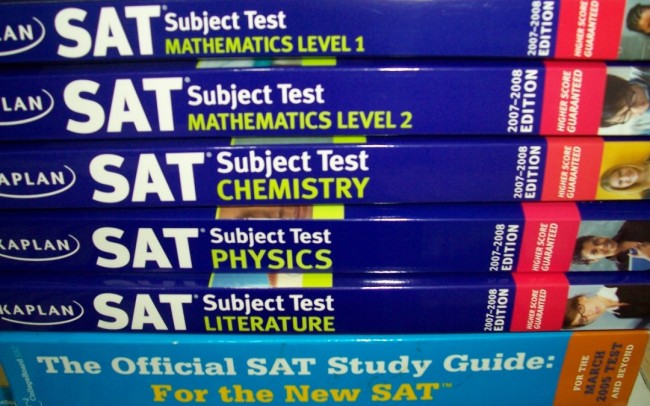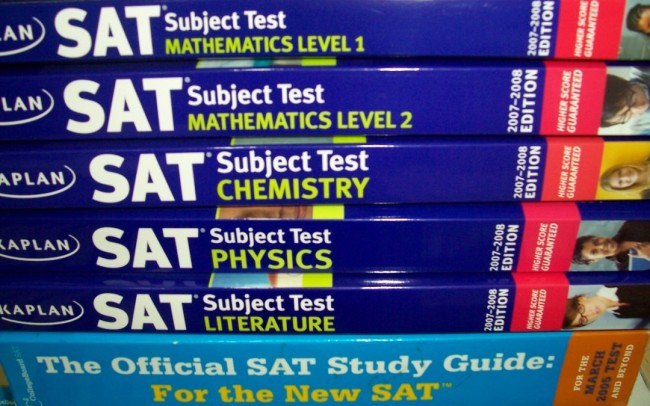The SAT is one of the most well-known, and perhaps one of the most dreaded, college admissions tests. A little less infamous are the SAT Subject Tests, previously called the “Scholastic Achievement Tests” or SAT II. Some colleges, especially Ivy League and other selective institutes, require or recommend that you take SAT Subject tests, especially if you are applying for particular courses or programs.
The SAT Subject Tests are 20 subjects in 5 general subject areas, 1-hour-long, and multiple-choice. They focus on individual subjects and will test the applicant’s understanding of the overall subject material learned throughout their academic career. They are scored between 200 to 800 and the five main disciplines are English, History, Languages, Mathematics, and Sciences. Each of these categories has at least one subcategory underneath it.
SAT Subject Tests can be an essential piece in your college application. SAT Subject Tests will measure a student’s readiness for college-level courses. The tests are designed to measure knowledge in specific areas, so colleges can decide if the applicant can be exempt from college requirements. However, no matter how well you do you are not able to earn college credits.
The subcategories within each subject are as follows:
- English: Literature
- History: U.S. History, World History
- Languages: Spanish, French, Italian, German, Latin, Hebrew, Chinese, Korean, and Japanese (Some will have an option to test listening comprehension and might require additional equipment)
- Mathematics: Level 1- college preparatory including one year each of algebra and geometry. Level 2 – all subjects from Level 1, plus trigonometry and pre-calculus
- Science: Biology – either Ecological or Microbiological, Chemistry, Physics.
The registration and test dates vary year to year, so it is essential that you check the website early to make sure you do not miss the deadline. They are offered six times a year and will correspond with the dates of the SAT, with one exception as the Subject Tests aren’t available in March. Not every discipline and their sub-category are available each testing date. Fees are also applicable and in some cases, can be waived for students from low-income families.
The SAT Subject Tests are not tied to any particular course on your transcript; they can be used instead to emphasize your abilities that are most relevant to your experiences and what you plan on studying in college. For example, if you already have a major or program in mind, taking a Subject Test in that subject matter can help showcase your qualifications or help with course placement.
Before preparing for the Subject Tests, check the requirements of each school you are applying to, and then choose the test you think will best demonstrate your talents and interests. Even if your perspective schools do not require them, you might want to consider taking the two to three tests. It can show your willingness to advance in your intended field and can help you stand out from the crowded playing field of applications.
Some students might benefit from taking the Subject Tests like international students, multilingual or ESL students, and homeschooled students. It can help validate your experiences or ensure that you are have learned the same material as other people your age who attended a more traditional U.S. high school.
Don’t confuse the SAT Subject Tests with Advanced Placement (AP) tests as they are very different tests. SAT Subject Tests are used as a baseline for a student’s understanding of the subject material from high school and do not count towards college credit. AP tests will cover college-level material and may count towards college credit.
Work the SAT Subject Tests to your advantage. Whether they are required or not, they can be a great asset on your transcript. Be selective in showcasing your skills, experiences, and interests so you can use them to help your college application stand out as much as possible.
*About the author:
Kristen Moon is an independent college counselor and founder of MoonPrep.com. Moon Prep provides one-on-one college counseling services. They guide students through the entire application process including: completing applications, personal statements, supplemental essays, student resumes, scholarships, and financial aid. Their specialty lies in the Ivy League, direct medical programs (BS/MD), and highly competitive universities.





